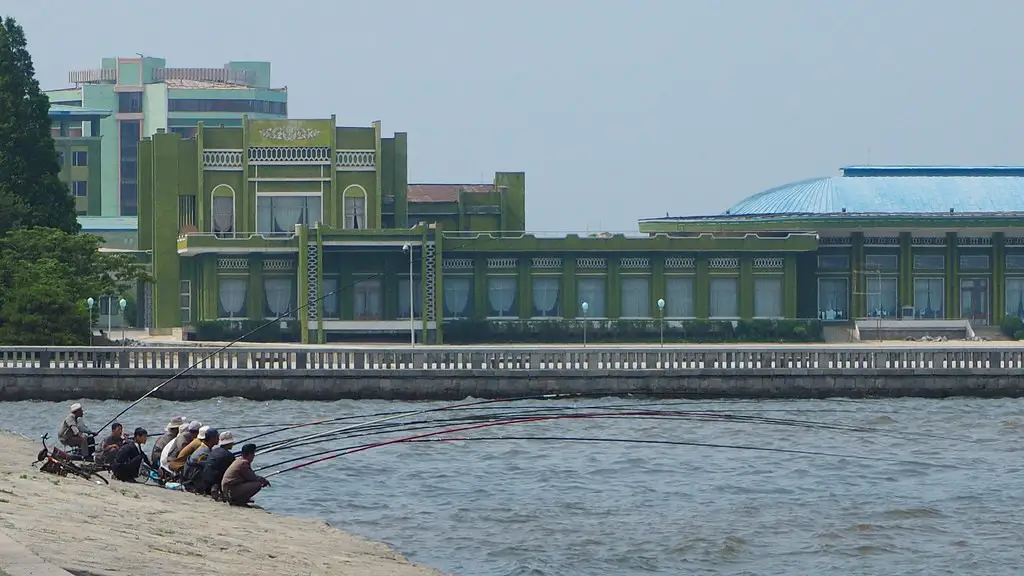North Korea’s Nuclear Ambitions
North Korea has long been the focus of international concern over its nuclear weapons program. Since its first nuclear tests in 2006, the country has grown increasingly bellicose and secretive, prompting speculation that its actions are designed to provoke a response from the US and its allies. As a result, the US government has been debating whether or not to take military action against North Korea in order to prevent it from advancing its nuclear program.
The current crisis pits the Trump administration’s “maximum pressure” campaign against North Korea’s attempts to advance its nuclear weapons within the regime’s broader strategy of preserving its own power. The US has ratcheted up sanctions and diplomatic pressure on North Korea, while the North Korean government has been steadily building up its arsenal of weapons and making threats to neighboring countries.
At the same time, there have been some positive developments, including the 2018 summit between President Trump and North Korean leader Kim Jong-un. Despite this meeting, however, US intelligence reports indicate that North Korea continues to pursue its nuclear program and has taken defiant steps such as launching missiles and reopening nuclear research facilities.
The US faces a difficult decision over whether it should take military action to curb North Korea’s nuclear ambitions. Advocates of intervention argue that the US must take decisive action to prevent North Korea from becoming a nuclear power, while opponents argue that further US military action would only worsen the situation and could even spark a conflict on the Korean Peninsula.
US Agenda
The US government is certainly wary of any further escalation of tensions with North Korea, as it could have serious repercussions for the region and beyond. The Trump administration has stated that it does not seek to overthrow the North Korean regime and is instead focusing on denuclearization.
The US is also pushing for a diplomatic solution to the crisis. President Trump has proposed holding a summit with North Korean leader Kim Jong-un in late 2018 or early 2019, and has held multiple meetings with South Korean President Moon Jae-in in an attempt to jump-start talks with North Korea.
The US has been pursuing a policy of “maximum pressure” on North Korea, using economic sanctions and diplomatic isolation to pressure the North Korean regime to abandon its nuclear program. US officials have also suggested that military action remains an option, although they have not laid out a concrete plan.
The US has also sought to work with other countries to increase pressure on North Korea, such as through pushing tougher sanctions at the UN Security Council or working with China and Russia to limit North Korea’s access to the world economy.
North Korea’s Perspective
From North Korea’s perspective, it views any US military action as an existential threat to the regime’s survival. The North Korean government has portrayed itself as a “David” facing off against a powerful “Goliath,” with US military intervention seen as an assault on the North Korean people.
Despite US pressure, North Korea has been unrelenting in its pursuit of a nuclear arsenal. The regime has continued to launch missiles, restarted nuclear research facilities, and threatened to expand its arsenal if the US does not make concessions. North Korea has also sought to drive a wedge between the US and its allies by reaching out to countries such as South Korea and Japan for economic cooperation, hoping to weaken any international pressure against it.
North Korea has also been willing to negotiate with the US and other countries, but the negotiations have so far been unsuccessful. This is in part because the North Koreans have been unwilling to commit to giving up their nuclear arsenal, viewing it as their only protection from US military intervention.
International Reaction
The international community has been largely united in its opposition to North Korea’s nuclear program. The UN Security Council has imposed extensive sanctions on the North Korean regime, hoping to deter it from further nuclear proliferation.
China and Russia, North Korea’s two most important allies, have also been vocal in their opposition to North Korea’s nuclear ambitions. Both countries recognize the danger that North Korea’s nuclear weapons pose to the region and to global security, and have used both diplomatic and economic measures to try to restrain North Korea.
Other countries such as Japan, South Korea, and the UK have also expressed strong opposition to North Korea’s nuclear program and have emphasized the importance of a diplomatic solution to the crisis. Germany has proposed a diplomatic “freeze” on North Korea’s nuclear program, while France has pushed for an international inspection system that would ensure that North Korea does not pursue a nuclear weapons program.
Impact Of Military Action
The greatest fear surrounding a US military intervention is that it could lead to a full-scale war on the Korean peninsula. Such a conflict would have disastrous consequences for the region and could potentially draw in other powers, such as China and Japan, which could have devastating global implications.
In addition, US military intervention would undermine the US’s efforts to bring North Korea to the negotiating table. It would also likely prompt North Korea to intensify its nuclear program, as the regime views its nuclear weapons as its only protection from US military action.
Furthermore, US military intervention could deepen North Korea’s isolation and cause an economic collapse, leading to a humanitarian crisis in the country. The North Korean regime could also use a US military intervention as a rallying cry to drum up nationalist sentiment, which could lead to further repression of its own citizens.
Alternatives To Military Action
Given the risks and costs associated with military intervention, some analysts have argued for other options. They suggest that the US should focus on diplomacy and economic measures, such as further sanctions and increased international pressure, in order to persuade North Korea to abandon its nuclear ambitions.
Others have proposed establishing a “freeze” on North Korea’s nuclear program, which would involve the US and other countries making concessions in exchange for North Korea suspending its nuclear activities. This could involve reducing economic sanctions, providing humanitarian aid and technology transfers, and establishing an international inspection system to monitor North Korea’s nuclear activities.
Finally, some have suggested that the US and other countries should pursue a strategy of containment, whereby they focus on preventing North Korea from advising its nuclear capabilities while accepting that it has some nuclear weapons. This could involve providing North Korea with security assurances, as well as working with China and other countries to place limits on North Korea’s nuclear activities.
Domestic Politics
The US debate over how to handle North Korea has also been complicated by domestic politics. President Trump has sought to make a deal with North Korea that would be viewed favorably by his domestic base, but the deal has so far been unsuccessful.
The debate has also been complicated by questions of credibility. President Trump has been criticized for making threats against North Korea and then backing down, which some analysts argue has undermined US credibility and weakened the country’s negotiating position.
Another complicating factor is the lack of available options. Though the US wants to prevent North Korea from becoming a nuclear power, there is no clear path forward that would accomplish that without sparking a conflict. As a result, President Trump is left with few good options and US policy towards North Korea remains in flux.
Military Action As A Last Resort
Given the risks and costs associated with military action, it is clear that it should be seen as a last resort. The US should continue to pursue diplomatic and economic measures, and should make clear that it does not seek to overthrow the North Korean regime.
At the same time, the US should make it clear that it will not tolerate North Korea’s nuclear ambitions, and will take a tough stance if necessary. This could involve working with other countries to further increase pressure on North Korea or using military action as a deterrent.
Ultimately, any US military intervention in North Korea should be seen as a means of protecting the US and its allies and preventing the North Korean regime from using its nuclear weapons against them. The US should seek to resolve the North Korea crisis peacefully, but should be prepared to act if necessary.





